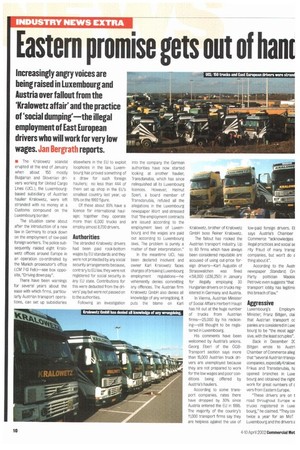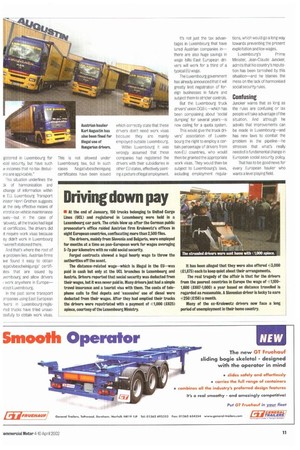Eastern promise gets out of ham
Page 10

Page 11

If you've noticed an error in this article please click here to report it so we can fix it.
Increasingly angry voices are being raised in Luxembourg and Austria over fallout from the Iralowetz affair' and the practice of 'social dumping'—the illegal employment of East European drivers who will work for very low wages. Jan Bergrath reports.
• The Kralowetz scandal erupted at the end of January when about 150 mostly Bulgarian and Slovenian drivers working for United Cargo Lines (UCL), the Luxembourgbased subsidiary of Austrian haulier Kralowetz, were left stranded with no money at a Customs compound on the Luxembourg border.
The situation came about after the introduction of a new law in Germany to crack down on the employment of low-paid foreign workers. The police subsequently raided eight Kralowetz offices around Europe in an operation co-ordinated by the Munich prosecutor's office (CM 7-13 Feb I—see box opposite, "Driving down pay".
There have been warnings for several years about the ease with which firms. particularly Austrian transport operations, can set up subsidiaries elsewhere in the EU to exploit loopholes in the law. Luxembourg has proved something of a draw for such foreign hauliers; no less than 444 of them set up shop in the Eli's smallest country last year. up 19% on the 1992 figure.
Of these about 85% have a licence for international haulage; together they operate more than 6,000 trucks and employ almost 8.700 drivers.
Authorities
lhe stranded Kralowetz drivers had been paid rock-bottom wages by EU standards and they were not protected by any social security arrangements because, contrary to EU law, they were not registered for social security in any EU state. Contributions for this were deducted from the drivers pay but were not passed on to the authorities.
Following an investigation into the company the German authorities have now started looking at another haulier, Transdanubia, which has since relinquished all its Luxembourg licences. However, Helmut Sperl, a board member of Transdanubia, refuted all the allegations in the Luxembourg newspaper Wort and stressed that "the employment contracts are issued according to the employment laws of Luxembourg and the wages are paid out accordng to Luxembourg laws. The problem is purely a matter of their interpretation."
In the meantime UCL has been declared insolvent and owner Karl Kralowetz faces charges of breaking Luxembourg employment regulations—he vehemently denies committing any offences. The Austrian firm Kralowetz GmbH also denies all knowledge of any wrongdoing. It puts the blame on Karl Kralowetz. brother of Kralowetz GmbH boss Reiner Kralowetz.
The fallout has rocked the Austrian transport industry Up to 80 firms which have always been considered reputable are accused of using cut-price foreign drivers—Karl Augustin of Strasswalchen was fined 4e58,000 (36,250) in January for illegally employing 30 Hungarian drivers on trucks registered in Germany and Austria.
In Vienna, Austrian Minister of Social Affairs Herbert Haupt has hit out at the huge number of trucks from Austrian firms-25,000 by his reckoning—still thought to be registered in Luxembourg.
His comments have been welcomed by Austria's unions. Georg Eberl of the OGBTransport section says more than 15,000 Austrian truck drivers are unemployed because they are not prepared to work for the low wages and poor conditions being offered by Austria's hauliers.
According to some transport companies, rates there have dropped by 30% since Austria entered the EU in 1995. The majority of the country's 11,000 transport firms say they are helpless against the use of low-paid foreign drivers. El says Austria's Chamber Commerce "acknowledges illegal practices and social se rity fraud of many transp companies, but won't do a thing about it".
According to the Austr newspaper Standard, Go Party politician MadelE Petrovic even suggests "that transport lobby has legitimi: this breach of law."
Aggressive
Luxembourg's Employm
Minister, Franz Biltgen, clai that Austrian transport cc genies are considered in LIRE bourg to be "the most aggr sive, with the least scruples".
Back in December 2C Biltgen wrote to Austri Chamber of Commerce alleg that "several Austrian transpi companies, especially KralowE Frikus and Transdanubia, ha opened branches in Luxe bourg and obtained the right work for great numbers of c vers from Eastern Europe.
"These drivers are on road throughout Europe w trucks registered in Luxe bourg," he claimed. "They cot twice a year for an MoT Luxembourg and the drivers a gistered in Luxembourg for icial security, but have such ▪ incomes that no tax deduc t are applicable."
This situation underlines the JA of harmonisation and change of information within
e EU. Luxembourg Transport inister Henri Grethen suggests at the only effective means of xitrol is on vehicle maintenance Ries—but in the case of nalowetz, all the trucks had legal st certificates. The drivers did it require work visas because ey didn't work in Luxembourg -weren't stationed there.
And that's where the root of e problem lies. Austrian firms we found it easy to obtain legativbescheinigungs certifiites that are issued by ixembourg and allow drivers work anywhere in Europe— (cent Luxembourg.
In the past some transport ripanies using East European rivers in Luxembourg-regis;red trucks have tried unsuc ssfully to obtain work visas. This is not allowed under Luxembourg law, but in such cases Negativbescheinigung certificates have been issued which correctly state that these drivers don't need work visas because they are mainly employed outside Luxembourg.
Within Luxembourg it was wrongly assumed that these companies had registered the drivers with their subsidiaries in other EU states, effectively painting a picture of legal employment. It's not just the tax advantages in Luxembourg that have lured Austrian companies in— there are also huge savings in wage bills: East European drivers will work for a third of a typical EU wage.
The Luxembourg government has already announced that it will greatly limit registration of foreign businesses in future and subject them to stricter controls.
But the Luxembourg truck drivers union OGB-L—which has been complaining about `social dumping' for several years—is now calling for a quota system.
This would give the truck drivers' association of Luxembourg the right to employ a certain percentage of drivers from non-EU countries, who would then be granted the appropriate work visas. They would then be subject to Luxembourg's laws, including employment regula
tions, which would go a long way towards preventing the present exploitation and low wages.
Luxembourg's Prime Minister, Jean-Claude Juncker, admits that his country's reputation has been tarnished by this situation—and he blames the mess on the lack of harmonised social security rules.
Confusing
Juncker warns that as long as the rules are confusing or lax people will take advantage of the situation. And although he admits that improvements can be made in Luxembourg—and has new laws to combat the problem in the pipeline—he stresses that what's really needed is fundamental change in European social security policy.
That has to be good news for every European haulier who wants a level playing field.
















































































































































